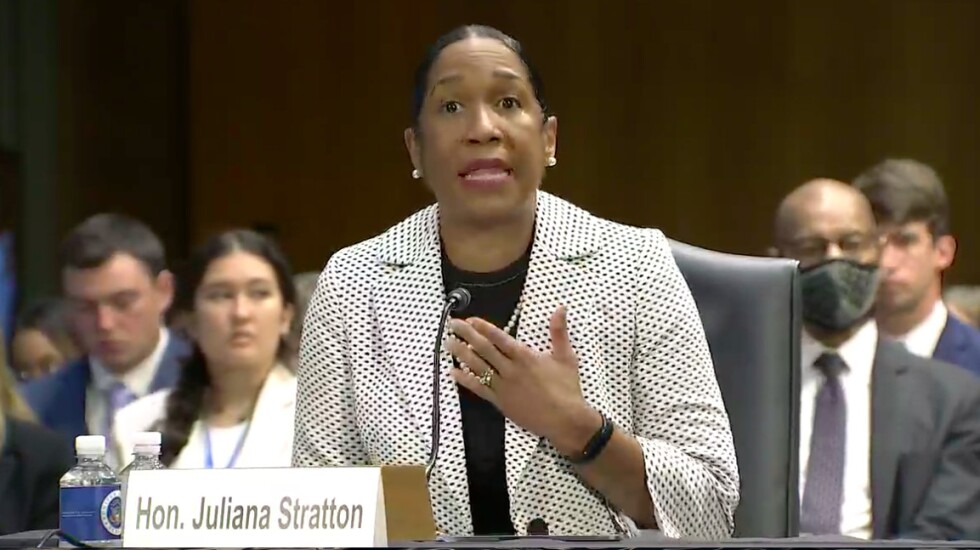
Lt. Gov. Juliana Stratton testified Tuesday before the Senate Judiciary Committee in Washington that Illinois, now an “island” for reproductive rights, needs more federal support to handle an influx of patients seeking abortions — and more legal protections for patients and abortion providers — in a post-Roe v. Wade world.
“Before the threats to Roe v. Wade were fully realized, Illinois was proactive, upholding bodily autonomy and protecting the right to an abortion,” Stratton testified. “And still, the overturning of Roe v. Wade has sent us down a dark, agonizing path.”
In his opening statement, Democratic Sen. Dick Durbin, chair of the Senate Judiciary Committee, called the Supreme Court decision “the first time in America’s history that the Supreme Court has revoked a constitutionally protected right.”
The hearing marked the first time the Senate has returned to Washington since the Roe v. Wade reversal, with no immediate abortion rights legislation in sight. And Stratton’s appearance came as Illinois remains in the spotlight as a Midwestern haven for women to seek reproductive care. Ten states have already banned abortions, and more bans are expected in the coming weeks.
Stratton, a mother of four daughters, appears in a TV ad that began airing this week for Gov. J.B. Pritzker’s reelection campaign, alongside other abortion rights supporters who tout the protections the Democratic governor signed into law in anticipation of the Supreme Court ruling.
“I come before you today because people throughout the entire Midwest are relying on our commitment to protect and preserve women’s rights — namely the right to an abortion,” Stratton said Tuesday.
Stratton said patients are coming to Illinois from every surrounding state to seek care — but also from states such as Tennessee, Texas, Louisiana, Alabama and Florida.
“It looks like the entire staff in our state’s abortion clinics are fielding phone calls for appointments because the number of out-of-state patients has doubled since Roe v. Wade was overturned — and that is on top of the nearly 10,000 women who already came to Illinois seeking abortion care,” Stratton said.
Stratton testified that Pritzker has asked President Joe Biden for more access to federal funds to support the demand of women coming into the state for reproductive health care and to create a centralized hub for providers and patients to ease the burden on abortion care providers in Illinois.
Pritzker has already called for a special legislative session to further protect reproductive rights in Illinois but has not yet set the dates. Stratton said “the potential criminalization of patients coming to our state is certainly top of mind in Illinois.”
“It’s not just the patients, it’s also the abortion care providers that also could potentially risk that same sort of criminalization,” Stratton said. “And so, we are working with our state’s leaders, are gathering to talk about how we can continue to expand and further enshrine reproductive rights into state law because, again, everyone should be able to feel safe and be able to have access to health care.”
Stratton was among five witnesses who appeared before the committee, which also heard from Dr. Colleen P. McNicholas, chief medical officer of Planned Parenthood of the St. Louis Region and Southwest Missouri. McNicholas practices in Missouri, where abortions are now banned, and in Illinois, where Planned Parenthood operates a center near the Missouri-Illinois border.
Wearing a “Bans Off Our Bodies” button on her lapel, McNicholas said patients have traveled as far as 1,000 miles each way to seek reproductive health care in Illinois since the June 24 ruling.
“Almost overnight, our Illinois clinic has seen appointments triple, and that’s already on top of a double-booked schedule we were sustaining in the wake of Texas and Oklahoma’s abortion bans,” McNicholas said.
“As we’ve long said, overturning Roe will not stop the need for abortion. The Supreme Court’s decision has already pushed people, the people each one of you represents, into extreme and sometimes dangerous circumstances in order to access one of the safest and most common health care procedures.”
McNicholas said doctors are now “afraid to make decisions that they know are the best health care for people” for fear of criminalization of their actions.
Khiara M. Bridges, a professor at University of California Berkeley School of Law, testified that the Supreme Court decision disproportionally affects people of color, with the abortion rates of Black women being three to four times higher than those of white women, the direct result of Black people’s high rate of unintended pregnancy due to a higher rate of poverty.
Denise Harle, director of the Center for Life, was among two anti-abortion advocates appearing before the committee. Harle called Roe v. Wade “a shameful, dehumanizing and false characterization of the role that women and moms hold in our society.”
Sen. Chuck Grassley of Iowa, ranking Republican member of the committee, said the Roe v. Wade reversal “corrected a wrong that has impacted millions of lives.”







